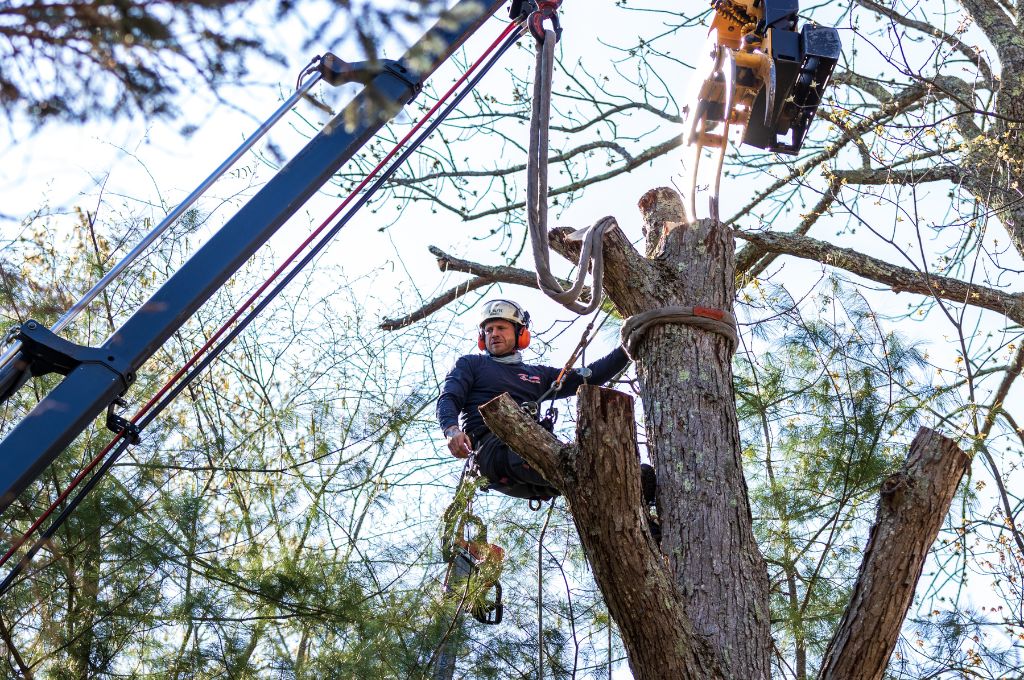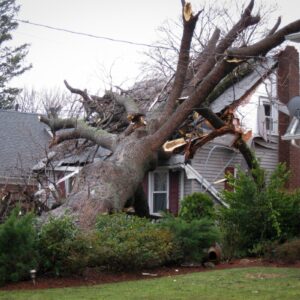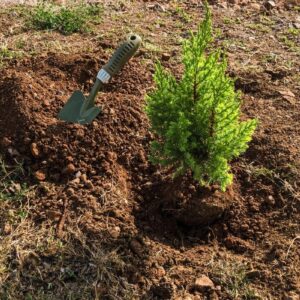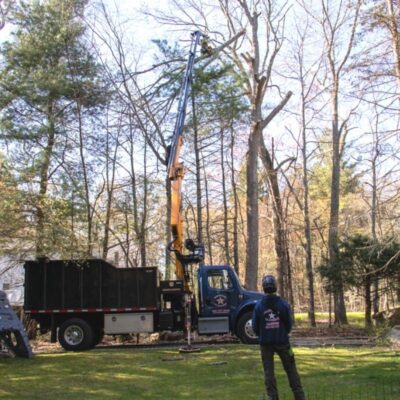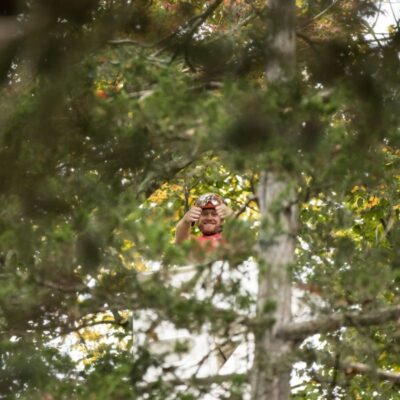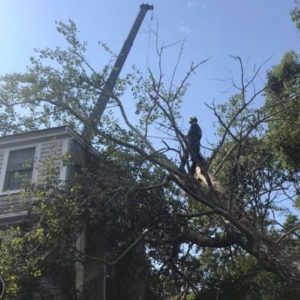Insurance coverage for tree work done on your property probably isn’t the first thing you consider when hiring someone to prune, remove, treat, or maintain your trees. But it’s arguably the most crucial consideration. Along with vetting a company’s experience and references, getting insurance documentation is critical in determining if a tree care company is right for you.
In this article, we will look at the importance of insurance for tree care companies. We’ll examine the dangers in tree care work and how insurance mitigates the risk to the company and you.
Not All Tree Services Are the Same
Many opt for a provider who can get the job done quickly and cheaply. Often, that’s a “tree guy” with a pickup truck and a chainsaw or a landscaper offering “tree trimming” services.
But what happens if a tree or branch falls on a person or structure while (or even after) the work is being done? Of if someone falls or gets cut? The outcome depends on the types and level of insurance coverage held by the person or company doing the work.
PRO TIP: Learn more about how cheap tree care may cost you money in the long run with our previous article on the topic: The Real Cost of Poor Tree Care
The Dangers of Tree Work
It’s not always obvious how dangerous tree work can be, particularly for those without the training, equipment, and experience to do it properly and safely. Tree work is done at heights and is affected by heavy objects, unpredictable events, dangerous tools, and more. Some of the most hazardous tasks for tree care companies include:
- Storm-damaged tree removal
- Removing trees near power lines
- Removing trees in confined spaces
- Pruning large and tall trees
- Dead tree removal (especially removal of dead ash trees)
While landscapers and “tree guys” often take on the dangerous tasks seasoned tree care industry employees are trained to perform, they don’t have the same technical training and experience, nor do they carry the same level of insurance.
Tree Care Industry Fatality and Injury Statistics
Tree work is one of the most dangerous industries in the country, according to statistics from the Tree Care Industry Association (TCIA). The Bureau of Labor Statistics (BLS) measures the danger of a job as a fatality rate out of 100,000 full-time equivalent (FTE) workers. If you pool every industry together, the rate usually sits between 3.4 and 3.8 fatalities per 100,000 FTE every year.
Of the general pool of 1.3 million ground maintenance workers (which includes tree workers), the fatality rate sits at around 17 per 100,000 FTE, far greater than average. The BLS does not explicitly separate tree care workers from this, but estimates from the BLS report the fatality rate at 110 per 100,000 tree care workers.
Injuries are also much more common, with tree workers averaging 239 injuries per 10,000 FTE (the BLS uses 10,000 for non-fatal injuries), while the national average is around 89 per 10,000 FTE.
Types of Insurance Coverage for Tree Care Companies
There are two types of insurance coverage to look at – general liability and workers’ compensation. The tree care professional you hire must have both to be adequately protected.
General Liability Insurance
Although it’s called “general” liability insurance, it’s particular regarding the type of work the insurance policy covers. If someone performs tree work, their insurance policy must specifically cover it. If not, any damages or injuries from tree work on your property will not be covered.
Insurance policies for landscapers are different – they only cover work done on the ground and up to about 8 or 10 feet above that. If a person climbs up over 10 feet to work on your tree (or even if they just climb a ladder to reach a branch) and something happens, their insurance will not cover it. In that situation, you may be liable for injuries, damage, medical bills, lost wages, etc.
Some tree care services will purchase arborist insurance, which combines general liability insurance with other coverages.
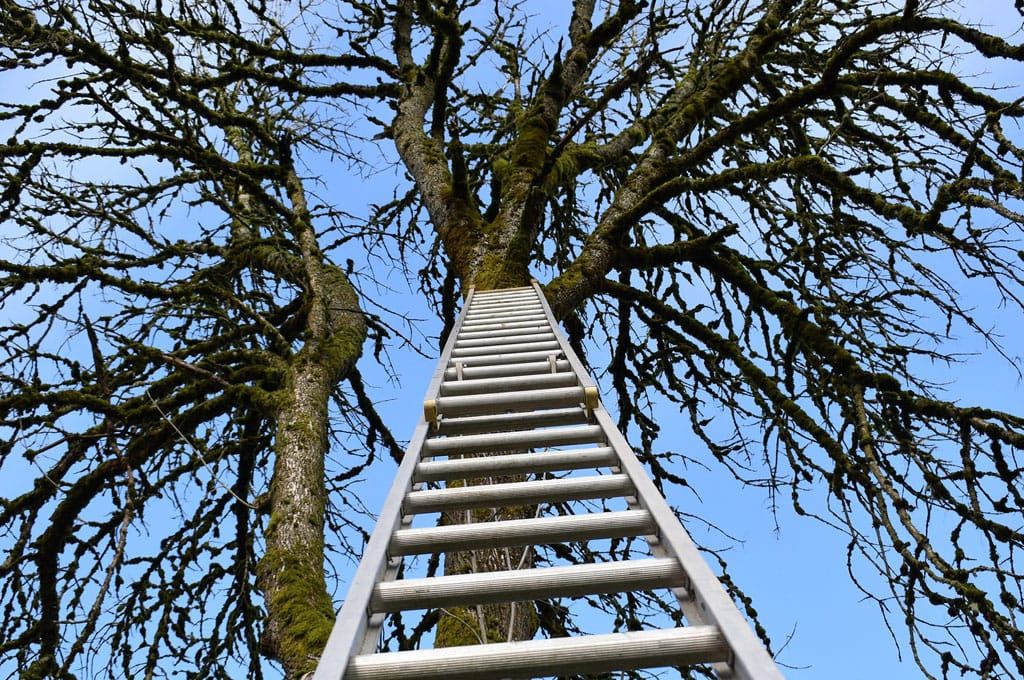
The wrong equipment can lead to severe injuries or death. An upstanding tree service will always use an orchard ladder when pruning trees, as well as other equipment like bucket trucks.
Workers’ Compensation Laws
Massachusetts law requires all companies to carry workers’ compensation insurance (with a few notable exceptions).
As with general liability insurance, workers’ compensation insurance must specifically cover tree work (not just landscaping or similar work) to be valid.
Although many companies claim to be fully covered by workers’ compensation insurance, they may not always be covered for tree work.
Tree work coverage is costly (which is not surprising, given the dangerous nature of the work). To cut costs, some companies doing tree work choose to classify themselves as landscapers instead (or forgo workers’ compensation entirely). They can then pass the cost savings on to you in the form of a lower price for tree work. But don’t be fooled – they’ve really passed the risk on to you!
Without the correct type of workers’ compensation coverage, the business owner is legally required to pay for work injuries to any crew members. And if they can’t or won’t? As the property owner who hired the company, you are on the hook.
While you can sue the company to recover damages, you’ll still have to pay for the injured person’s medical bills, lost wages, and other costs associated with the injury until the case is settled.
Understanding Coverage Limits
The coverage limits on the insurance policy are also critical. The limits should be high enough to pay for any costs arising from an accident or injury. Some minimum limits to look for are:
- General Liability: $1 million for each occurrence and $2 million aggregate
- Automobile Liability: $1 million for each accident
- Umbrella Liability: $1 million
- Workers Compensation: $500,000 per accident
Tree care is inherently dangerous. Ensure the company or arborist you hire is well protected with tree care-specific workers’ compensation coverage.
Don’t be Afraid to Request a Certificate of Insurance
To ensure that you’re adequately protected, always ask for the insurance company to send you a Certificate of Insurance (COI) (it should look like this) so you can be sure that the policy is still in effect and covers tree work. A photocopy provided by the business owner is a good start, but you should still ask for the “real” COI. There’s usually no charge for this.
If a company takes offense to your request for the insurance certificate, rethink whether you should do business with them.
American Climbers Has the Proper Qualifications and Insurance for Tree Work
The next time you get a proposal for tree work (especially one that seems too good to be true), ask to see policy documents for general liability and workers’ compensation. The low-cost providers generally don’t have both types of insurance or have low policy limits, putting you and your family at risk should an accident happen on your property.
At American Climbers, we believe in doing things by the book. We have all the proper qualifications and insurance to perform tree work in Hopkinton, Massachusetts, and the surrounding areas. And if you don’t want to take our word for it, we’d be happy to show you proof of our insurance.
If you want to see why we’re Massachusetts’ favorite tree care company, call us today at 508-497-8628 or request a quote online.
Blog Topics
Recent Posts
What's Happening? Stay Informed!
Stay on top of local events, pest and disease updates, tree and landscape tips, and more. Delivered straight to your inbox each month.


